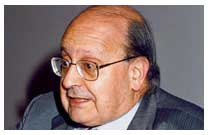 In 1988 the World Health Organization has issued a “gender challenge” to nations and international organizations, a call for: a better appreciation of risk factors involving women’s health; the development of preventive strategies to lessen the impact of diseases that disproportionately plague older women (e.g., coronary heart disease, osteoporosis, and dementia); and an increased emphasis on understanding why men die sooner than women. (World Health Organization, 1998, The World Health Report 1998, Geneva).
In 1988 the World Health Organization has issued a “gender challenge” to nations and international organizations, a call for: a better appreciation of risk factors involving women’s health; the development of preventive strategies to lessen the impact of diseases that disproportionately plague older women (e.g., coronary heart disease, osteoporosis, and dementia); and an increased emphasis on understanding why men die sooner than women. (World Health Organization, 1998, The World Health Report 1998, Geneva).
Gender Medicine focuses on the impact of the gender on human physiology, pathophysiology, and clinical features of diseases. The concept of Gender refers to a complex interrelation and integration of sex – as a biological and functional marker of the human body – and psychological and cultural behaviour (due to ethnical, social, and religious background). Human health is strictly correlated to these two fundamental constituents of the gender. While the effect of sex, age, and cultural behaviour on the health of both women and men has been widely studied, attention to the impact of the gender differences on the pathophysiology and, therefore, on the management of the most common social diseases – such as cardiovascular diseases, osteoporosis, diabetes, neurodegenerative disorders, anxiety and mood disorders, joints and rheumatic diseases, some tumors, to list a few – is both needed and lacking.
Precise explanations of the gender differences in life expectancy still elude scientists because of the apparent complex interplay of biological, social, and behavioural conditions. In order to win this exciting new battle for better health, the scientific community needs to develop a multidisciplinary approach integrating different competences and players such as physicians, researchers and experts in economics, clinical governance, communications, regulatory issues, health organization, education and training, and many sectors of industry.
In response to this challenge the Giovanni Lorenzini Medical Foundation* is assisting in the establishment of the European Society of Gender Health and Medicine.
The aims of the Society, to mention a few, are:
- to link all the scientists and physicians who operate in the field of prevention, primary and secondary care, and rehabilitation by focusing on the biological, physiological and pathological differences between women and men;
- to support researchers, medical doctors, institutions, and individuals to identify healthcare issues and protect the health in both women and men;
- to improve the cultural background, professional updating, and the training of experts in Gender Medicine;
- to promote the inclusion of gender perspectives in the programs of both public and governmental institutions;
- to develop alliances with research centres, scientific societies, hospitals, academia;
- to reach a more and more personalized medicine; and
- to educate the public on the gender differences in healthcare needs.
These goals can only be reached through the collaboration and active participation of all the experts who work in the field of health prevention and care and are interested in the development of this new biomedical research area.
Prof. Rodolfo Paoletti
Emeritus of Pharmacology
University of Milan
and
President
Italian Society of Gender Health and Medicine
European Society of Gender Health and Medicine



 In 1988 the World Health Organization has issued a “gender challenge” to nations and international organizations, a call for: a better appreciation of risk factors involving women’s health; the development of preventive strategies to lessen the impact of diseases that disproportionately plague older women (e.g., coronary heart disease, osteoporosis, and dementia); and an increased emphasis on understanding why men die sooner than women. (World Health Organization, 1998, The World Health Report 1998, Geneva).
In 1988 the World Health Organization has issued a “gender challenge” to nations and international organizations, a call for: a better appreciation of risk factors involving women’s health; the development of preventive strategies to lessen the impact of diseases that disproportionately plague older women (e.g., coronary heart disease, osteoporosis, and dementia); and an increased emphasis on understanding why men die sooner than women. (World Health Organization, 1998, The World Health Report 1998, Geneva).